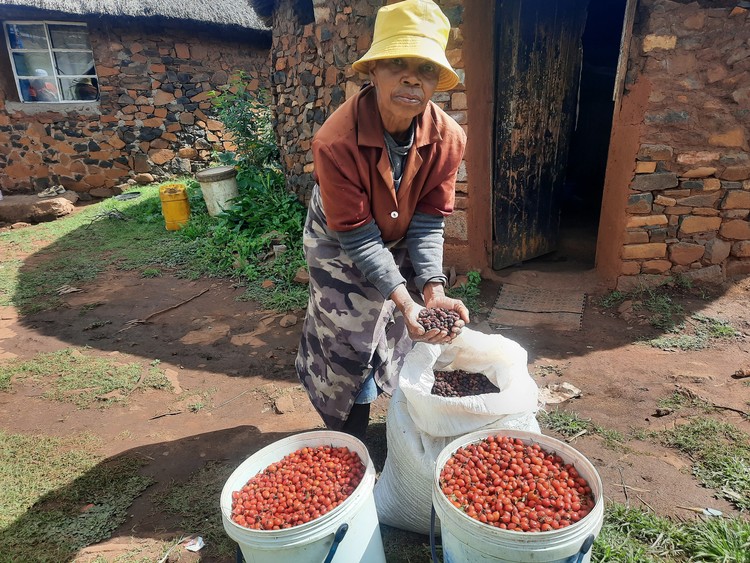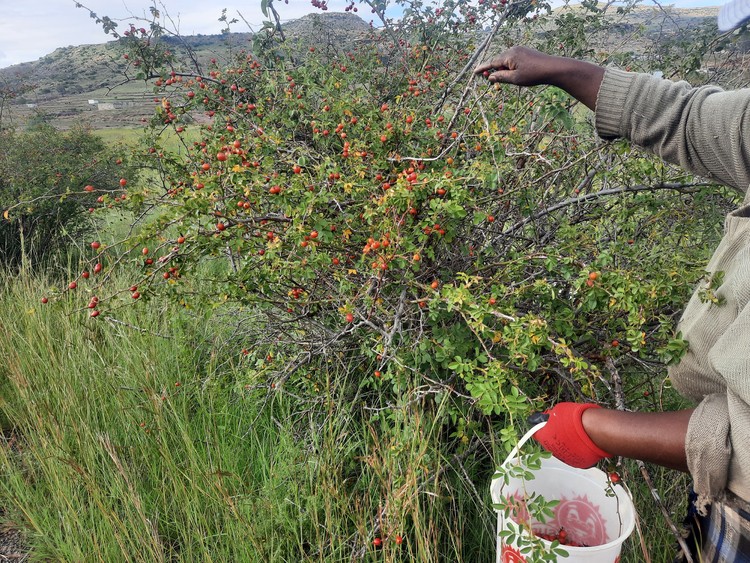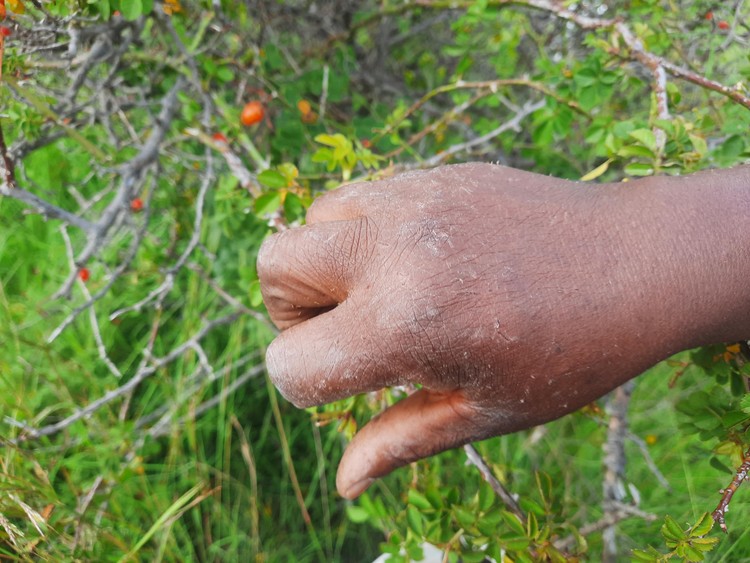The thorny truth of Lesotho’s rosehip industry
Villagers survive on meagre earnings while big companies make millions
M’e Mapotsana Hlopho helps sustain her family by picking rosehips, which grow wild in Lesotho. One 20-litre bucket sold for between M100 and M200 (M1.00 = R1.00) this year. Photos: Sechaba Mokhethi
- Lesotho’s wild-harvested rosehips are an important industry for the small country’s economy, providing thousands of people in rural villages with a source of income.
- But pay is lower than minimum wage, harvesters are not protected by labour law, and they lack proper protective gear to guard against the rosa canina plant’s thorny branches.
- Despite this, large international companies boast of the social impact of their rosehip sales.
“Meet ‘M’e Mapotsane Hlopho, one of nearly 3,500 harvesters who hand-picks rosehip every season in the Mountain Kingdom of Lesotho near the tip of Africa … This is the impact of strategic investments.”
This was posted about a year ago on LinkedIn by Frederick Jordaan, former manager of the 1K1V Fund, a key investor in The Rosehip Company in Lesotho. The Rosehip Company is one of the country’s leading producers of rosehip, the fruit of rosa canina, an alien shrub that grows wild throughout the small land-locked country.
Rosehip is used worldwide in skincare products, herbal teas and horse feed.
“Investment creates jobs which accelerate prosperity,” Jordaan’s post reads. The Rosehip Company provides employment for thousands of women, who each support an average of eight dependents, he said.
But when GroundUp visited Hlophe’s home in ‘Masemousu in March, it was clear she has not achieved “prosperity” and instead lives in abject poverty.
“I have worked all these years and have nothing to show for it,” said Hlopho. Her ten-member household lives in two thatched huts.
Hlopho is one of thousands of people in rural villages who pick the bright red berries during spring and summer every year. During harvest season, dozens of pickers line up outside processing plants to sell their buckets of berries to large companies for cash. The berries are then dried in big industrial ovens before export.
After Chile, Lesotho is the world’s biggest producer of rosehip. It has become an important industry for the country’s small economy. But while Lesotho’s rosehip ends up in the products of massive international corporations, harvesters say they are underpaid and face unsafe conditions.
A woman harvesting rosehips. Wearing thick gloves protects against thorns but makes it difficult to pick the fragile berries.
Low pay
Harvesters say they work about nine hours a day to collect between 10 and 20 litres of berries. They can sell a 20-litre bucket directly to companies for between M100 and M120 (M1.00 = R1.00). Some don’t deliver directly to companies but rather to “buyers” in villages, who pay less per 20-litre bucket — about M50 (R50) this year.
With the global rosehip price falling, the price per 20-litre bucket could drop to M80 next season, according to sources in the industry.
The Rosehip Company’s compliance manager Atang Mantutle told GroundUp that the “buying price is determined by moisture content and the competition between the companies in the market.” He said The Rosehip Company did not dictate the prices, but that they were agreed through community councils in different areas.
Asked about Jordaan’s claims on LinkedIn, Mantutle told GroundUp that “The Rosehip Company is not able to answer on behalf of Mr Jordaan. Mr Jordaan does not represent the company.”
Jordaan no longer manages 1K1V and the fund is in the process of divesting from The Rosehip Company. “Private Equity investments usually rotate or exit in five year intervals. We were nearing the end, but all is not yet concluded,” said Mantutle.
Organic Rosehip International, another large rosehip supplier in Lesotho, paid harvesters R100 per 20-litre bucket this season, the company’s director Bulukani Masola told GroundUp.
He showed us examples of contracts the company had signed with harvesters. The contracts don’t specify a price and require harvesters to sell exclusively to Organic Rosehip International, but Masola said “they are free to sell to anyone they want”.
Tsebiso Mohapi, the company’s community liaison officer, explained that their price was based on the minimum wage for casual workers, which he said ranged from M65 to M85 per day. Masola said they pay more than the textile sector.
But according to Lesotho’s 2024 minimum wage schedule, textile workers with under 12 months’ experience should earn M119/day, and those with over 12 months M133/day. The minimum wage for general workers in Lesotho is M115 a day.
When this was pointed out to Masola, he responded: “It’s not about minimum wages, whatever! For our harvesters, it is simply about the value of the commodity they bring to us, which we pay for.”
The price of a kilogram of processed, dried rosehip cannot be directly compared to that of a kilogram of fresh raw material due to moisture loss during drying. But depending on the quality and grade of the rosehip (for instance, certified organic), the final product is sold at high prices. One of the cheapest products is the powder used for horse feed. Elite Equine SA sells 1kg of rosehip powder at R680 and 5kg at R2,495.
The scratched hands of a rosehip harvester.
Safety concerns and child labour
The rosehip bush is thorny and the berries contain fine hairs that irritate the eyes and throat.
Hlopho and some other pickers GroundUp spoke to say they have not been offered protective equipment. “White people come here every year, take videos, listen to our complaints, and promise us gloves and protective clothes, but nothing changes,” Hlopho said.
Those who do have gloves say they still sometimes pick with their bare hands because the gloves make it difficult to pick the fragile berries. Some people even wrap their hands in sellotape to protect against the worst thorns while maintaining dexterity.
A woman in a rural village in Mekaling showed us her scratched hands. “My hands get irritated and develop rashes every harvest season. When I get home, I soak them in warm water to remove the thorns. It’s painful, but I have to work to survive,” she said.
In Tosing, harvester Maemisang Makolojane told GroundUp: “The thorns tear our clothes and injure us. It’s painful, but we need the income.”
She added that during community meetings, they were advised to stop harvesting if they bled, to avoid contaminating the rosehip. “That’s not realistic as we want to harvest more. So we cover the wounds and continue working.”
Children are often seen harvesting berries, although companies say they prohibit child labour.
GroundUp also encountered children in different villages as young as nine picking rosehips. The Lesotho Labour Act 2024 prohibits child labour in all forms for those under 18.
Masola, from Organic Rosehip International, said the company’s policies prohibit child and forced labour. But he acknowledged the reality on the ground.
“The issue of child labour is a bread-and-stomach issue in the rosehip industry. The mother knows that if they bring them on board, instead of one bucket, they’ll have three more buckets. It’s a catch-22 situation.”
Mosola said the company had in the past supplied gloves to two of the villages where harvesting takes place, but emphasised that these were not provided for free. He said each pair of long gloves cost M150, and harvesters paid for them with rosehips. He acknowledged that the remaining villages have not been provided with any protective clothing.
The Rosehip Company’s Mantutle said they take “the safety and well-being of the harvesters we buy from very seriously. We have provided hand rakes to participating communities to help prevent injuries from thorns and reduce strain during harvesting,” Mantutle said.
But, Mantutle said, the rakes “were not well adopted by the communities”. Harvesters have also been given garden shears “to trim back bushes, making future harvesting safer and more accessible”.
A former employee of the Rosehip Company told GroundUp anonymously that only in some areas have harvesters been given gloves and rakes.
“These harvesters are not contracted. They sell to whoever offers the best price. Providing them with tools is a courtesy, hoping they will return the following year. But when someone else offers more, they sell to them. That’s why the company can’t sustainably provide personal protective equipment,” he said.
Mantutle also said the company has a “strict policy prohibiting the purchase of harvested material from children … This policy is audited annually by the external certification body KIWA, as part of our UEBT (Union for Ethical BioTrade) certification process.”
Rosehips laid out on a shade cloth so that they do not start rotting before they are delivered to a rosehip company.
Social impact claims
Despite the conditions faced by harvesters, international brands boast of the social impact of their operations.
“Driven through active community development,” reads a poster by Organic Rosehip International at their stall at the Natural and Organic Products Expo.
German tea giant Teekanne says on it’s website: “For us, acting sustainably also means acting socially, which is why we care about the well-being of the people from the countries of origin of our raw materials,” adding that with their supplier in Lesotho, The Rosehip Company, they have found “meaningful ways to support the local community”.
Rozuri by Maya, a France-based luxury skincare brand, sources oil from The Rosehip Company and sells a 30ml anti-ageing oil for $115 (M2,180). Rozuri’s 45ml of firming cream retails for $130 (M2,460). Rozuri claims that for every bottle sold, “$1 [M18.84] is donated to uplift the incredible communities in Lesotho who hand-harvest the sustainably sourced, high-quality Rosehip used in our formulas.”
On their website, Elite Equine Rosehip Supplement US, which also sources from The Rosehip Company in Lesotho, says they “take pride in knowing that there is no purer or more responsibly sourced rosehip seed oil in the world than the one we use in our products”.
Mantutle said donations are used to support the Mantsase Children’s Home. “Currently, we are doing building upgrades at the home to improve living conditions,” he said.
The Rosehip Company has also provided 4,000 or 4,500 spinach seedlings and two beehives in each of the eight districts of Lesotho in villages of ‘Muela, Ha Lejone, Ha Mokonyana, Ha Chadwick, Matelile, and ‘Masemouse, said Mantutle.
As for Organic Rosehip International, Masola said the company is introducing a “fair-trade model”, whereby 15% of the product selling price will go to a community trust.
“The board of trustees will have nine members who are harvesters. We’re also engaging communities to identify projects they’ll undertake with the funds,” he said.
Masola, originally from Zimbabwe, noted that similar fair-trade efforts have been implemented successfully there over the past ten years.
He also said the company has a project to employ factory workers from the villages where rosehip is harvested. To date, he said the company has invested over M30-million into the project, also revealing that there are ongoing discussions with the Minister of Trade about involving the Lesotho National Development Corporation as a shareholder.
No regulation
It appears that the rosehip industry is largely unregulated by the Lesotho government. This is despite the government pinning its hopes on rosehip exports in the wake of the tariffs it faces from the US government.
The Ministry of Labour did not respond to GroundUp’s questions about how labour law applies to the rosehip industry. Spokesperson Maqalika Matsepe said he was conducting “internal consultations” regarding harvesters’ rights.
The Ministry of Agriculture said it has no regulatory role in rosehip harvesting.
Meanwhile, the Ministry of Trade and Industry’s spokesperson Lihaelo Nkaoto said that there are only three companies that have applied for permits to export rosehip, but there are many more companies that export rosehip without permits. Therefore, the government could not provide statistics on the size of the rosehip industry.
Rose canina is an alien shrub that grows wild in the Lesotho Highlands.
Support independent journalism
Donate using Payfast

Don't miss out on the latest news
We respect your privacy, and promise we won't spam you.
Next: More than R4-billion has flowed to dodgy water contracts, SIU probe finds
Previous: Mining companies are breaking their promises - and the state is doing nothing about it
© 2025 GroundUp. This article is licensed under a Creative Commons Attribution-NoDerivatives 4.0 International License.
You may republish this article, so long as you credit the authors and GroundUp, and do not change the text. Please include a link back to the original article.
We put an invisible pixel in the article so that we can count traffic to republishers. All analytics tools are solely on our servers. We do not give our logs to any third party. Logs are deleted after two weeks. We do not use any IP address identifying information except to count regional traffic. We are solely interested in counting hits, not tracking users. If you republish, please do not delete the invisible pixel.






